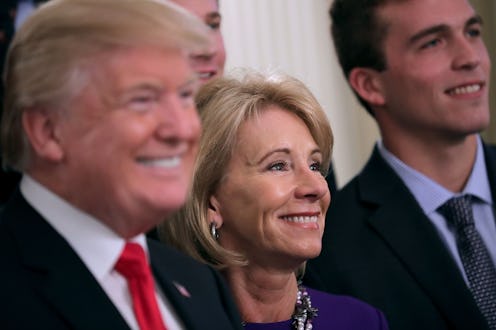News
How Betsy DeVos Is Planning To Limit Civil Rights Investigations At Schools

There have beens changes brewing at the Education Department since Betsy DeVos, Donald Trump's appointee to head the federal agency, started earlier in 2017. Title IX rules that tried to reduce sexual assault on school campuses were revoked, and protections for trans students went out the window. But the Trump administration is not done. It looks like the Education Department might limit its civil rights investigations at schools. The Associated Press reported that a very important word might be kept out of future guidelines for such cases.
That word is "systemic." Currently when the government receives a civil rights complaint about a school from a student or parent, it does not just explore that individual incident, but rather related systemic problems that could lead to the incident recurring again or on a bigger, broader, and more systemic scale. They wouldn't just investigate one instance of discrimination, but whether that was common behavior for a teacher, school, or school district.
That meant that the schools in question would then be investigated longer by the Office for Civil Rights and often receive more detailed and involved resolutions for how to address whatever was found. Now the draft of the new guidelines that the department will use to run these investigations has gotten rid of the word "systemic" completely. The draft won't be made final until at least next year after input from staff, but the Associated Press received an early copy.
The change to a "systemic" investigation came about under Obama, and some critics complained that it lead to slower resolutions of complaints. The department should respond in 180 days, but it was regularly pushing the deadline. Education Department spokeswoman, Liz Hill, said the processing time "skyrocketed" with the prior investigation style. "Justice delayed is justice denied, and justice for many complainants has been denied for too long," Hill said in a statement given to The New York Times earlier this year.
The guideline change is not a complete surprise — Assistant Secretary for Civil Rights Candice Jackson first suggested this priority months ago — but some of the other aspects that were included in the draft guidelines were unexpected. The Associated Press reported that the schools who are accused of a violation will have more control of the process at the expense of students and parents.
Perhaps most shockingly, there will be no more appeals process at all. Plus the school will be allowed to negotiate with the Department of Education about the resolution before the parent or student is informed of the finding in a letter. "The letter may still reach the same result, but it may be completely diluted of any fact that would inform the parent and the community about what's going on in the school," Seth Galanter, the former principal deputy assistant secretary for human rights in Obama's Education Department told the AP.
The AP also reported that the Trump administration wants to cut $9 billion from the Education Department, meaning a possible cut of at least 40 out of 570 positions at the Office for Civil Rights. But even before the budget cuts, staffing levels are down at the office.
Politico reported that of 255 voluntary offers sent out Nov. 1 to separate or retire early for employees at the Education Department, some 45 were at the Office for Civil Rights. That's a bigger proportion than what would come with the president's proposed cuts.
Sen. Patty Murphy of Washington told Politico that she thought DeVos was trying to manipulate staffing levels to make the argument for a smaller civil rights impact. Murphy said she was "appalled" that DeVos "would use a lack of staffing and resources as an excuse to roll back civil rights investigations and protections, and then turn around and attempt to shrink these critical offices."
The reshaping of guidelines could be just the first step.